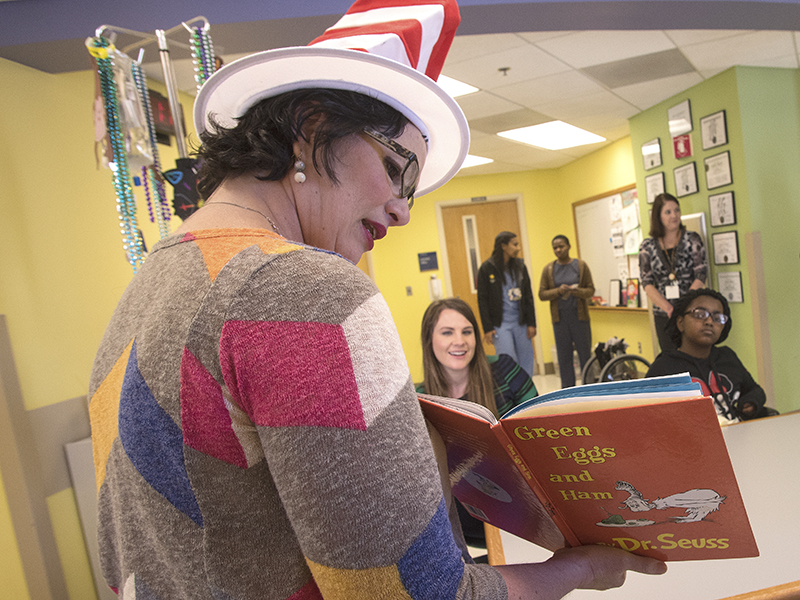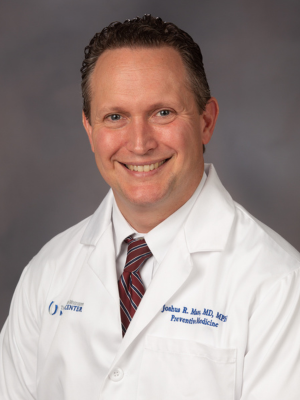Grateful attitude can have positive impact on health, recovery
NOTE: This article originally appeared in the November 2017 issue of CONSULT, UMMC's monthly electronic newsletter. To have CONSULT, and more stories like this, delivered directly to your inbox, click here to subscribe.
It’s not unusual to monitor your health by counting calories as you belly up to a Thanksgiving feast.
Add one more tally to that list, one that can impact your mental and physical well-being year ‘round: Do the math on your blessings and add up your opportunities to be grateful.

“Being thankful helps us to operate from a particular mindset,” said Doris Whitaker, head chaplain at the University of Mississippi Medical Center. “That mindset sets the foundation for what we think or do or say for that day.
“It helps us interface with the realities of our world and our lives in a more effective and positive manner, and that’s good for your mental health.”
When you’re grateful, Whitaker said, you appreciate yourself and your body more. You take better care of your body and you go to the doctor more often because you want to stay healthy.
Even if that goes awry, people can still find themselves grateful for the facets of their health that are still good to go, Whitaker said.
“I’ve had patients who were in a wreck still have a tone of gratefulness,” she said. “This person is having one of the worst days of their life, and that gratefulness helps them to cope and acknowledge that they could be dead, but they’re still alive.
“We’re a Level I trauma center. We get devastating accidents and illness, but we still have those patients who say it could have been worse. It floors me at times.”
A constant “can-do” attitude and thankfulness for her breast cancer treatment upped Pam Parks-McCord’s physical and mental well-being.
“Some people would dread chemo,” said Parks-McCord, a teacher at Batson Children’s Hospital who was diagnosed with stage 3B inflammatory breast cancer in 2015. “I couldn’t wait to get there.

“I’m so grateful for modern medicine. I was so grateful I had the opportunity to fight. I never missed a treatment because my numbers weren’t good. I never threw up one time.”
She remembers receiving the chemo drug known as “Red Devil” because of its brutal side effects – extreme nausea, short-term memory loss, sweating and mouth sores, for starters.
“One of my nurses said, ‘That’s the blood of Jesus.’ And I said, ‘Yes it is, and I want that,’” Parks-McCord said. “It was such a relief to have that treatment.”
Parks-McCord teaches patients on Batson’s oncology unit.
“The blessing of this job worked for me,” she said. “If those kids could do it, I could do it. I’d get here and work with my patients, and I’d forget that I was sick.
“I was so thankful to try to be normal.”

And there’s something to that, said Dr. Joshua Mann, professor and chair of the Department of Preventive Medicine.
“There are definitely studies that show that people with higher levels of gratitude have better moods and reduced stress, and there’s some linkage to reduced inflammation,” Mann said. “There’s debate about whether it’s just that person’s personality or nature.
“A lot of it is subjective, but from a research standpoint, being grateful can have a positive effect. If I’m down and I’m reminded of things to be grateful for, it keeps me moving forward. I think that’s important.”
Even if it’s painful, sometimes being grateful helps ease unthinkable mental anguish, Whitaker said. Recently, she was ministering to parents in the NICU.
“I was with a family, and their baby had just died,” she said. “The father was holding the baby. I noticed he was very quiet. I created a space for him to think. I asked him if he wanted to share what he was thinking.
“He said, ‘I’m just glad my baby’s not suffering.’ It touched my heart. I laid my hand on his shoulder and said, ‘You’re a good, good father.’ He wept.
“It was a moment of sweetness and sacredness. He was able to say, ‘I’m glad my baby is not suffering.’ I thanked the Lord.”



